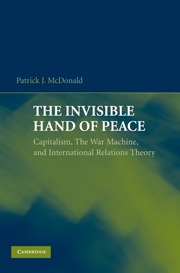Book contents
- Frontmatter
- Contents
- List of Tables
- Acknowledgments
- 1 American Grand Strategy and the Liberal Peace
- 2 Liberal International Relations Theory on War
- 3 Releasing the Invisible Hand
- 4 Liberal Economic Institutions and Peace in the Twentieth Century
- 5 Free Trade and Peace in the First Era of Globalization
- 6 From Rivalry to Friendship
- 7 The Achilles' Heel of Liberal International Relations Theory?
- 8 Peace Across the Taiwan Strait?
- 9 The Invisible Hand or the Ballot Box?
- 10 Capitalism and America's Peaceful Market Power
- References
- Index
7 - The Achilles' Heel of Liberal International Relations Theory?
Published online by Cambridge University Press: 05 June 2012
- Frontmatter
- Contents
- List of Tables
- Acknowledgments
- 1 American Grand Strategy and the Liberal Peace
- 2 Liberal International Relations Theory on War
- 3 Releasing the Invisible Hand
- 4 Liberal Economic Institutions and Peace in the Twentieth Century
- 5 Free Trade and Peace in the First Era of Globalization
- 6 From Rivalry to Friendship
- 7 The Achilles' Heel of Liberal International Relations Theory?
- 8 Peace Across the Taiwan Strait?
- 9 The Invisible Hand or the Ballot Box?
- 10 Capitalism and America's Peaceful Market Power
- References
- Index
Summary
Despite thousands of monographs, governmental inquiries, and nearly a century of intense research, scholarly controversy still surrounds the outbreak of World War I. This body of work has generated literally hundreds of explanations for those ominous political decisions made in July 1914. It is not difficult to look at the enormity of this literature, conclude that the outbreak of this war was overdetermined, and decide that any further research offers little intellectual leverage in understanding both this particular conflict and its place in the broader study of war. European leaders had been sitting on a powder keg and narrowly sidestepping war for nearly a decade. Even if some political compromise, like the kaiser's “Halt in Belgrade” solution, had been reached at the end of July, an incredibly unstable political situation on the continent in which leaders increasingly viewed war as inevitable made it unlikely that the diplomats would repeatedly be able to steer peacefully out of each new crisis.
The tendency to point to this case as the most glaring weakness of liberal international relations theory necessitates revisiting its origins in light of the arguments raised here. Rather than asking why globalization failed to prevent war, I build on the discussion from prior chapters that illustrated how the dramatic expansion in international trade during this period occurred despite extensive government constraints on private economic activity.
- Type
- Chapter
- Information
- The Invisible Hand of PeaceCapitalism, the War Machine, and International Relations Theory, pp. 185 - 232Publisher: Cambridge University PressPrint publication year: 2009



